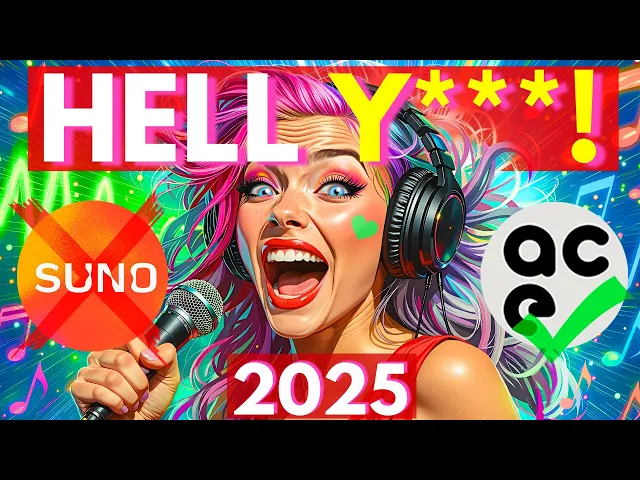RIP SUNO! NEW FREE UNCENSORED AI MUSIC KING IS HERE!

Google's AI music game is changing everything
In a stunning development for creators and musicians alike, Google's free AI music generator has leapt to the forefront of generative audio technology, potentially dethroning Suno as the market leader. The landscape of AI music creation is evolving rapidly, and for those of us who create content regularly, these developments could fundamentally transform our workflows.
Google's AI music generator, part of their expanding suite of creative tools, has quickly distinguished itself through a combination of quality, accessibility, and perhaps most importantly, its permissive usage terms. While Suno has dominated the AI music conversation until now, Google's entry into this space represents a significant shift that deserves our full attention, especially if you're a content creator concerned about copyright issues or commercial usage rights.
-
Google's AI music generator produces remarkably high-quality output that rivals or exceeds Suno's offerings, with impressive vocals, instrumentation, and production value that feels increasingly indistinguishable from human-created music.
-
Unlike many competitors, Google's tool appears to have minimal content restrictions, allowing for a wider range of creative expression including potentially controversial lyrics that might be filtered on other platforms.
-
The rights and permissions around Google's AI-generated music appear exceptionally creator-friendly, potentially allowing for commercial usage without the complex licensing issues that plague other AI music tools.
-
The simplicity of Google's prompt-based interface makes professional-sounding music creation accessible to non-musicians, democratizing music production for content creators across various platforms.
-
This development may signal Google's strategic positioning in the creative AI space, leveraging their vast resources to capture market share in generative audio.
Why This Matters More Than You Might Think
The most significant takeaway here isn't just that Google has created another AI music tool – it's the potential liberation of content creators from the copyright minefield that currently exists. For years, creators have navigated increasingly complex licensing requirements, content ID systems, and the constant threat of demonetization. Google's approach, if it maintains its current trajectory, could represent a genuine paradigm shift in how we think about music creation and licensing.
This matters because audio remains one of the most tightly controlled and aggressively litigated aspects of content creation. While text and even images have seen some loosening of copyright
Recent Videos
How To Earn MONEY With Images (No Bullsh*t)
Smart earnings from your image collection In today's digital economy, passive income streams have become increasingly accessible to creators with various skill sets. A recent YouTube video cuts through the hype to explore legitimate ways photographers, designers, and even casual smartphone users can monetize their image collections. The strategies outlined don't rely on unrealistic promises or complicated schemes—instead, they focus on established marketplaces with proven revenue potential for image creators. Key Points Stock photography platforms like Shutterstock, Adobe Stock, and Getty Images remain viable income sources when you understand their specific requirements and optimize your submissions accordingly. Specialized marketplaces focusing...
Oct 3, 2025New SHAPE SHIFTING AI Robot Is Freaking People Out
Liquid robots will change everything In the quiet labs of Carnegie Mellon University, scientists have created something that feels plucked from science fiction—a magnetic slime robot that can transform between liquid and solid states, slipping through tight spaces before reassembling on the other side. This technology, showcased in a recent YouTube video, represents a significant leap beyond traditional robotics into a realm where machines mimic not just animal movements, but their fundamental physical properties. While the internet might be buzzing with dystopian concerns about "shape-shifting terminators," the reality offers far more promising applications that could revolutionize medicine, rescue operations, and...
Oct 3, 2025How To Do Homeless AI Tiktok Trend (Tiktok Homeless AI Tutorial)
AI homeless trend raises ethical concerns In an era where social media trends evolve faster than we can comprehend them, TikTok's "homeless AI" trend has sparked both creative engagement and serious ethical questions. The trend, which involves using AI to transform ordinary photos into images depicting homelessness, has rapidly gained traction across the platform, with creators eagerly jumping on board to showcase their digital transformations. While the technical process is relatively straightforward, the implications of digitally "becoming homeless" for entertainment deserve careful consideration. The video tutorial provides a step-by-step guide on creating these AI-generated images, explaining how users can transform...
